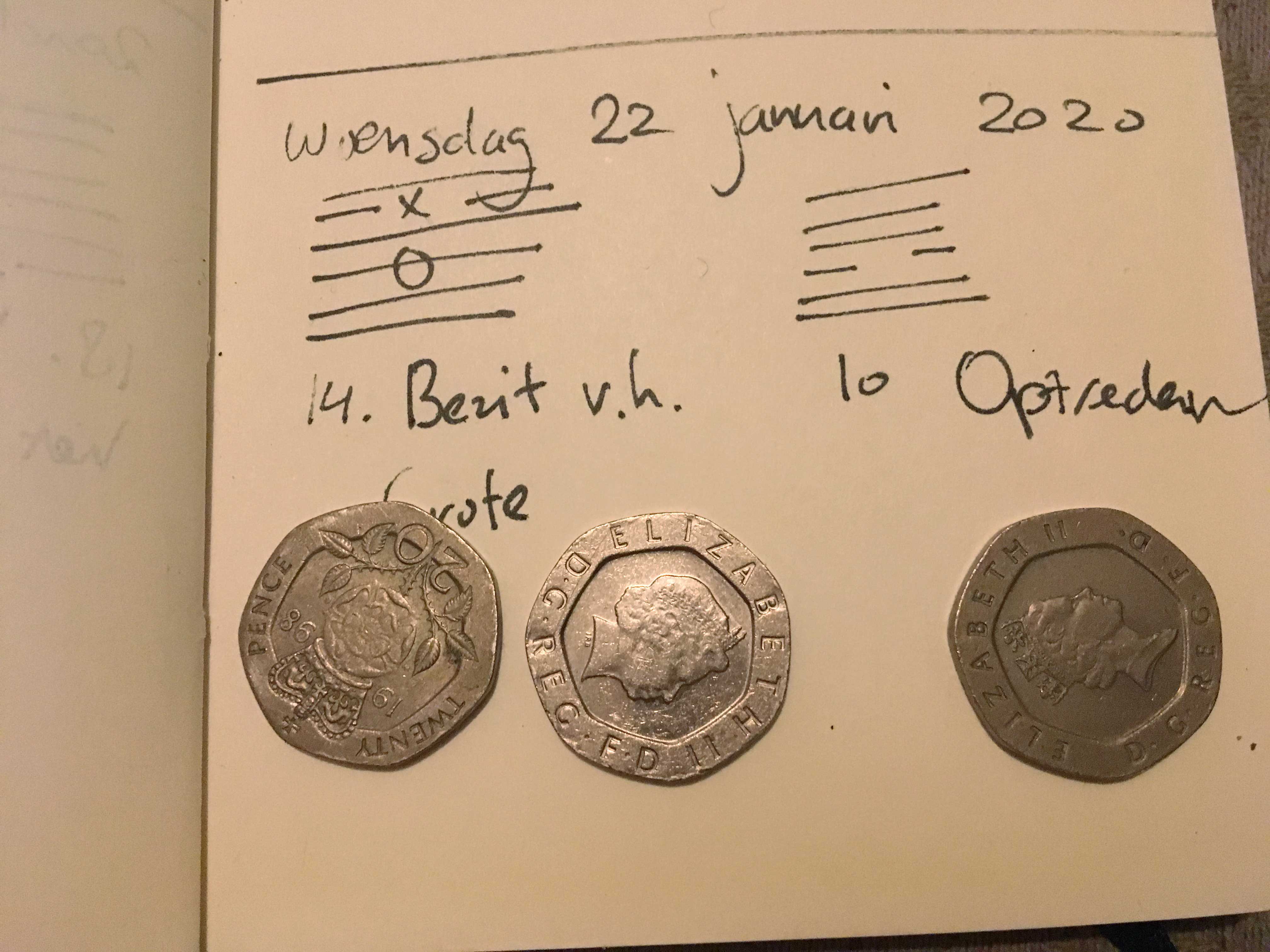
Possession in Great Measure
14. Ta Yu / Possession in Great Measure
above LI THE CLINGING, FLAME
below CH’IEN THE CREATIVE, HEAVEN
The fire in heaven above shines far, and all things stand out in the light and become manifest. The weak fifth line occupies the place of honor and all the strong lines are in accord with it. All things come to the man who is modest and kind in a high position.
THE JUDGMENT
POSSESSION IN GREAT MEASURE.
Supreme success.
The two trigrams indicate that strength and clarity unite. Possessions great measure is determined by fate and accords with the time. How is it possible that the weak line has power to hold the strong lines fast and to possess them? It is done by virtue of unselfish modesty. The time is favorable–a time of strength within, clarity and culture without. Power is expressing itself in graceful and controlled way. This brings supreme success and wealth.
THE IMAGE
Fire in heaven above:
the image of POSSESSION IN GREAT MEASURE.
Thus the superior man curbs evil and furthers good,
And thereby obeys the benevolent will of heaven.
The sun in heaven above, shedding light over everything one earth, is the image of possession on a grand scale. But a possession of this sort must be administered properly. The sun brings both evil and good into the light of day. Man must combat and curb the evil, and must favor and promote the good. Only in this way does he fulfill the benevolent will of God, who desires only good and not evil.
Nine in the third place means:
A prince offers it to the Son of Heaven.
A petty man cannot do this.
A magnanimous, liberal-minded man should not regard what he possesses as his exclusive personal property, but should place it at the disposal of the ruler or of the people at large. In so doing, he takes the right attitude toward his possession, which as private property can never endure. A petty man is incapable of this. He is harmed by great possessions, because instead of sacrificing them, he would keep them for himself.
°Six in the fifth place means:
He whose truth is accessible, yet dignified,
Has good fortune.
The situation is very favorable. People are being won not by coercion but by unaffected sincerity, so that they are attached to us in sincerity and truth. However, benevolence alone is not sufficient at the time of POSSESSION IN GREAT MEASURE. For insolence might begin to spread. Insolence must be kept in bounds by dignity; then good fortune is assured.
above CH’IEN THE CREATIVE, HEAVEN
below TUI THE JOYOUS, LAKE
The name of the hexagram means on the one hand the right way of conducting oneself. Heaven, the father, is above, and the lake, the youngest daughter, is below. This shows the difference between high and low, upon which composure correct social conduct, depends. On the other hand the word for the name of the hexagram, TREADING, means literally treading upon something. The small and cheerful [Tui] treads upon the large and strong [Ch’ien]. The direction of movement of the two primary trigrams is upward. The fact that the strong treads on the weak is not mentioned in the Book of Changes, because it is taken for granted. For the weak to take a stand against the strong is not dangerous here, because it happened in good humor [Tui] and without presumption, so that the strong man is not irritated but takes it all in good part.
THE JUDGMENT
TREADING. Treading upon the tail of the tiger.
It does not bite the man. Success.
The situation is really difficult. That which is strongest and that which is weakest are close together. The weak follows behind the strong and worries it. The strong, however, acquiesces and does not hurt the weak, because the contact is in goof humor and harmless.
In terms of a human situation, one is handling wild, intractable people. In such a case one’s purpose will be achieved if one behaves with decorum. Pleasant manners succeed even with irritable people.
THE IMAGE
Heaven above, the lake below:
The image of TREADING.
Thus the superior man discriminates between high and low,
And thereby fortifies the thinking of the people.
Heaven and the lake show a difference of elevation that inheres in the natures of the two, hence no envy arises. Among mankind also there are necessarily differences of elevation; it is impossible to bring about universal equality. But it is important that differences in social rank should not be arbitrary and unjust, for if this occurs, envy and class struggle are the inevitable consequences. If, on the other hand, external differences in rank correspond with differences in inner worth, and if inner worth forms the criterion of external rank, people acquiesce and order reigns in society.